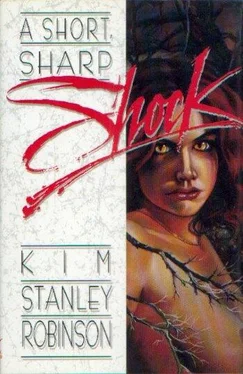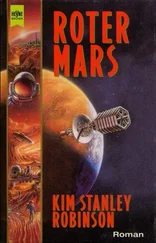A Short, Sharp Shock
by Kim Stanley Robinson
When he came to he was drowning. The water was black and he bobbed up in it swiftly, obscurely aware that it was dangerous to do so, but he was helpless to stop; he tumbled over and swam downward, arms loose and thrusting like tentacles, but it was useless. Air popped out of him in a stream of white bubbles that flattened and shimmied as they squashed upward, all clustered around bearing him to the surface. He glanced up, suddenly aware of the idea of surface; and there it was, an undulating sheet of obsidian silk on which chips of raw silver skittered wildly back and forth. A flock of startled birds turning all at once—no—it was, he thought as the world began to roar, the shattered image of a crescent moon. At the thought a whole cosmology bloomed in him—
And broke apart like the moon’s image, as he crashed up into the air and gasped. He flailed at the water whooping and kicking hard to stay afloat; he felt a wave lift him, and flopped around to face it. A cold smack in the face and he tumbled again, thrashed through a somersault and came up breathing, barking like a seal to suck in more air.
The next time under he rammed a sandbar and then he was rolling on a steep shorebreak, sluiced by sandy water and struck repeatedly by small silver fish. He crawled up through rushing foam, mouth full of salty grit, hands sinking wrist-deep in the wet sand. The little fish leaped in the phosphorescent foam, banged into his arms and legs. The beach was bouncing with silver fish, it was like an infestation of insects. On hands and knees he couldn’t avoid squashing some into the sand.
At the high-water mark he collapsed. He looked across a gleaming black strand, filigreed with sea foam receding on a wave. Coarse-grained sand sparked with reflected moonlight, and the fish arched to the shape of the crescent moon, which hung over the horizon at the end of a mirrorflake path of water. Such a dense, intricate, shifting texture of black and white—
A large wave caught him, rolled him back down among the suffocating fish. He clawed the sand without effect, then slammed into another body, warm and as naked as he was. The receding wave rushed down to the triple ripple of the low-water mark, leaving them behind: he and a woman, a woman with close-cropped hair. She appeared senseless and he tried to pull her up, but the next wave knocked them down and rolled them like driftwood. He untangled himself from her and got to his knees, took her arms and pulled her up the wet sand, shifting one knee at a time, the little silver fish bouncing all around them. When he had gotten her a few body lengths into dry sand he fell beside her. He couldn’t move.
From down the beach came shrill birdy cries. Children ran up to them shouting, buckets swinging at the ends of their arms like great deformed hands. When they ran on he could not move his head to track them. They returned to his field of vision, with taller people whose heads scraped the moon. The children dashed up and down the strand on the lace edge of the waves. They dumped full buckets of wriggling silver leaves in a pile beyond his head. Fire bloomed and driftwood was thrown on it, until transparent gold ribbons leaped up into the night.
Then another wave caught them and rolled them back down to the sea; the tide was rising and they would have perished, but the cords of a thrown net stopped them short, and they were hauled back and dumped closer to the fire, which hissed and sizzled. The children were laughing.
Later, fighting unconsciousness, he lifted the great stone at the end of his neck. The fire had died, the moon sat on the beach. He looked at the woman beside him. She lay on her stomach, one knee to the side. Dry sand stuck to her skin and the moonlight reflecting from her was gritty; it sparkled as she breathed. Powerful thighs met in a rounded muscly bottom, which curved the light into the dip of her lower back. Her upper back was broad, her spine in a deep trough of muscle, her shoulders rangy, her biceps thick. Short-cropped hair, dark under the moon’s glaze, curled tight to her head; and the profile glimpsed over one shoulder was straight-nosed and somehow classical: a swimmer, he thought as his head fell back, with the big chest and smooth hard muscling of a sponge diver, or a sea goddess, something from the myths of a world he couldn’t remember.
Then her arm shifted out, and her hand came to rest against his flank, and the feel of her coursed all through him: a short, sharp shock. He caught his breath and found he was sitting up facing her, her palm both cool and warm against his side. He watched her catch the moon on her skin and fling it away.
When he woke in the morning, the woman was gone. The sun burned just over the water. He lay on a crumbling sand cliff, the high mark of the previous tide’s assault on the beach. With his head resting on one ear, he saw a wet slick foam-flecked strand of silvery brown, and the sea; resting on the other, he saw a lumpy expanse of blond beach, dotted with driftwood. Behind the beach was a forest, which rose steeply to a very tall cliff of white stone; its top edge made a brilliant border with the deep blue sky above.
He lifted his head and noticed that the sand cliff under him was a tiny model of the granite cliff standing over the forest—a transient replica, already falling into the sea. But then again the immense rock cliff was also falling into the sea, the forest its beach, the beach its strand. It repeated the little sand cliff’s dissolution on a scale of time so much vaster that the idea of it made him dizzy. The tide ebbs and the stars die.
On the wet strand a troop of birds ran back and forth. They seemed a kind of sandpiper, except their feathers were a dark, metallic red. They stabbed away at dead grunion rolling in the wrack, and then dashed madly up the strand chased by waves, their stick legs pumping over blurred reflections of themselves. They made one of these frantic cavalry charges right under a thick white fishing line; surprised at the sight, he raised himself up on his elbows and looked behind him.
A surf fisher sat on a big driftwood log. In fact there were several of them, scattered down the beach at more or less regular intervals. The one closest to him was all in brown, an old brown woman in a baggy coat and floppy hat, who waved briefly at him and did not stir from her log.
He stood and walked to her. Beside her a bucket stood on the sand, filled with the little silver fish from the previous night. She gestured at the bucket, offering him some of the fish, and he saw that her hand was a thick mass of shiny dark brown, her fingers long tubes of lighter hollow brown, with bulbs at their ends. Like tubes of seaweed. And her coat was a brown frond of kelp, and her face a wrinkled brown bulb, popped by the slit of her mouth; and her eyes were polyps, smooth and wet.
An animated bundle of seaweed. He knew this was wrong, but there she sat, and the sun was bright and it was hard to think. Many things inside his head had broken or gone away. He felt no particular emotion. He sat on the sand beside her fishing pole, trying to think. There was a thick tendril that fell from her lower back to her driftwood log, attaching her to it.
He found he was puzzled. “Were you here last night?” he croaked.
The old woman cackled. “A wild one. The stars fell and the fish tried to become birds again. Spring.” She had a wet hissing voice, a strange accent. But it was his language, or a language he knew. He couldn’t decide if he knew any others or not.
She gestured again at her bucket, repeating her offer. Noticing suddenly the pangs of his hunger, he took a few grunion from the bucket and swallowed them.
Читать дальше












